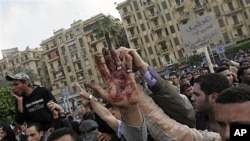Crowds of Egyptian protesters reoccupied parts of Cairo’s Tahrir Square Saturday, closing it to traffic after bloody skirmishes with Egyptian military police overnight. Conflicting reports say that at least two people died and 71 were injured in the violence.
Hundreds of protesters returned to Cairo’s Tahrir Square Saturday after violent clashes with military police overnight. The crowds gathered in numerous clusters, but were considerably smaller in size from Friday’s rally, which attracted tens of thousands and was the largest in Cairo in weeks.
Military police fired into the air in the wee hours of Saturday, apparently trying to disperse a crowd of mostly young protesters camped out in Tahrir Square. A young eyewitness named Amr Shawi describes what happened:
He said that at about 3:00 AM Egyptian time on Saturday, the army began to deploy, entering the square in large numbers from all directions, aided by military police in 12 armored vehicles. He said he was camped out in the middle of the square, facing the army. The protesters, he insists, were chanting "peaceful, peaceful," for a quarter of an hour when the army began firing automatic rifles into the air, using large quantities of ammunition. He claims that the army tried to seize several officers that had joined the protest camp, attacking, then killing three of them.
Another witness claimed that military police used a sword to kill a soldier who had joined the protesters. Several other soldiers inside the protest camp were wounded.
A statement by Egypt’s ruling Supreme Military Council claimed on Facebook that "elements of (former President Hosni Mubarak’s now dissolved) National Party were responsible for acts of violence."
Activists calling for the ouster of Egyptian Army commander Field Marshall Hussein Tantawi got into a shouting match with other activists Saturday during a press conference at Egypt’s Journalist’s Union. A union official accused some activists of trying to divide the army.
He argued that it is not in Egypt's interest to divide the army, insisting that the only institution that prevents Egypt from falling apart is the armed forces. He accuses another activist of using empty rhetoric, saying that only the guilty should be punished, not the entire army.
Amr Hamzawy of the Carnegie Foundation for Peace in the Middle East also addressed the gathering, insisting that activists should respect the rule of law.
He said that everyone should maintain self-control and respect the law. What took place, he insists, should first be investigated, before allowing the law to take its course and punish the guilty. He says that attempts to divide the army from the people come to the surface each time the noose tightens around former officials who are about to be punished.
Many protesters are demanding that former President Hosni Mubarak and other former officials be prosecuted for alleged wrong-doing and financial crimes. Mr. Mubarak and several former ministers are under house arrest and Egyptian prosecutors are investigating various allegations.
Hundreds Return to Cairo’s Tahrir Square After Bloody Clashes With Egyptian Military Police




